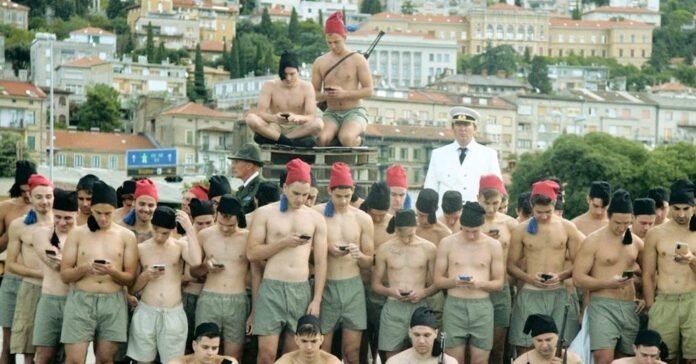Dir/scr. Igor Bezinovic. Croatia/Italy/Slovenia. 2025. 112mins
One of many weirder chapters of early twentieth century European historical past – the 1919, 16-month occupation of the town of Fiume (now Rijeka in Croatia) by an Italian superstar poet-turned-power crazed proto-fascist – is dropped at life on this irreverent and wildly entertaining documentary. Director Igor Bezinovic was born in Rijeka, and his playful imaginative and prescient shapes the movie. However what makes the undertaking so contemporary and sudden is the involvement of the folks of Rijeka, drafted in to take part in re-enactments, present narration and, within the case of seven males chosen primarily for his or her lack of hair, to play the central position of the dandy fascist himself, Gabriele D’Annunzio.
A really entertaining, maverick method to this era
Bezinovic’s dry humour is clear from the outset. Throughout a potted historical past evaluating modern Rijeka to the town of the previous, he concludes with the laconically delivered line “my Italian colleagues warned me to not point out fascism an excessive amount of within the intro, for the sake of Italian viewers, so I’ll cease right here.” However the director, whose earlier work consists of The Blockade, Veruda and A Temporary Tour, is just not within the enterprise of tiptoeing round nationwide sensibilities. Fiume O Morte! is forthright, unflinching and really humorous. The movie, which gained the highest prize in Rotterdam’s Tiger competitors, is a well timed reminder that laughing at fascists is a type of resistance and as such, it must be a title of curiosity for additional festivals and arthouse distributors.
Who was Gabriele D’Annunzio? It’s a query that Bezinovic poses to passers by on the streets of Rijeka, a few of whom flip up in costume later within the movie. Lots of these questioned know nothing about him; others know sufficient to sentence him for his politics. Just a few are unusually well-informed. D’Annunzio was, within the early twentieth century, Italy’s most well-known residing poet. He was celebrated for his writing, he was infamous for his lavish life-style and his quite a few lovers. (His reputation with the other intercourse was although he was as bald because the Duomo di Firenze, overly keen on cocaine and, in keeping with certainly one of Bezinovic’s advert hoc interviewees, had no enamel).
D’Annunzio was additionally considerably bellicose in his opinions on warfare and fight, essential of different cultures (he wrote of “Slavic bastards” and “filthy Croats”), and was drawn to the navy – he signed as much as the Italian military, aged 52, following the outbreak of WWI.
His occupation of Fiume is re-enacted, in all its surreal element, with the participation of some 300 or so current day residents of the town. It helps that D’Annunzio was impossibly useless and travelled together with his personal workforce of photographers and filmmakers, who captured over 10,000 photographs of his ill-considered marketing campaign. Bezinovic recreates many of those footage, encouraging a dialogue between the previous and the current, and intentionally permitting anachronistic components to bleed into the historic recreations.
However whereas it’s a very entertaining, maverick method to this era, the movie additionally makes critical factors – not least the best way wherein historical past is skewed relying on the lens via which it’s seen. In Rijeka, D’Annunzio is remembered as a fascist, if he’s remembered in any respect. His title, as soon as ubiquitous on the streets, squares and municipal buildings, has been erased. In Italy, nevertheless, he’s nonetheless celebrated as a patriot. Mussolini allegedly in contrast him to a rotten tooth: “you both pull it out or cowl it in gold.” He opted for the latter, awarding D’Annunzio a principality.
This movie ought to go a way in direction of redressing the steadiness on D’Annunzio’s legacy. It’s a gloriously punk spin on the historic documentary style, channeling the humour and rebellious spirit of a individuals who have been a part of “eight or 9 totally different international locations” in the course of the twentieth century, who’ve spoken a number of languages, however who’ve managed to keep up their very own distinct identification nonetheless.
Manufacturing firm: Restart
Worldwide gross sales: Lightdox hiya@lightdox.com
Producers: Vanja Jambrovic, Tibor Keser
Cinematography: Gregor Bozic
Modifying: Hrvoslava Brkusic
Music: Giovanni Maier, Hrvoje Niksic
Primary solid: Izet Medosevic, Cenan Beljulji, Albano Vucetic, Tihomir Buterin, Andrea Marsanich, Massimo Ronzani, Milovan Vecerina Cico
